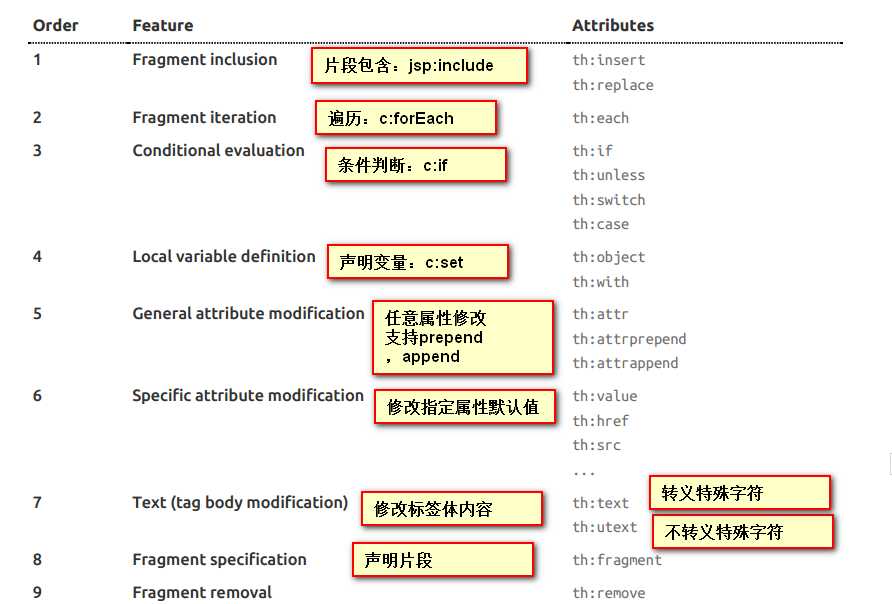标签:The set 导入 三元运算 end 运算 component prope arrays
SpringBoot中,项目以jar包的形式打包,而不是web项目,而且使用的tomcat是嵌入式的tomcat,故不支持JSP了
模板引擎:JSP、Velocity、Freemarker、Thymeleaf
SpringBoot推荐的Thymeleaf;
语法更简单,功能更强大;
<dependency>
<groupId>org.springframework.boot</groupId>
<artifactId>spring-boot-starter-thymeleaf</artifactId>
</dependency>
上面引入的版本默认是2.1.6,切换thymeleaf3版本,在properties标签下加入2个标签
<properties>
<thymeleaf.version>3.0.9.RELEASE</thymeleaf.version>
<!-- 布局功能的支持程序 thymeleaf3主程序 layout2以上版本 -->
<!-- thymeleaf2 layout1-->
<thymeleaf-layout-dialect.version>2.2.2</thymeleaf-layout-dialect.version>
</properties>@ConfigurationProperties(prefix = "spring.thymeleaf")
public class ThymeleafProperties {
private static final Charset DEFAULT_ENCODING = Charset.forName("UTF-8");
private static final MimeType DEFAULT_CONTENT_TYPE = MimeType.valueOf("text/html");
public static final String DEFAULT_PREFIX = "classpath:/templates/";
public static final String DEFAULT_SUFFIX = ".html";
//上面是springmvc中的前缀和后缀因为默认有前缀和后缀的设置,故只要我们把HTML页面放在classpath:/templates/,thymeleaf就能自动渲染;
使用:
1、在html页面中导入thymeleaf的名称空间(起提示作用)
<html lang="en" xmlns:th="http://www.thymeleaf.org">2、使用thymeleaf语法,举个例子:
<!DOCTYPE html>
<html lang="en" xmlns:th="http://www.thymeleaf.org">
<head>
<meta charset="UTF-8">
<title>Title</title>
</head>
<body>
<h1>成功!</h1>
<!--th:text 将div里面的文本内容设置为 -->
<div th:text="${hello}">这是显示欢迎信息</div>
</body>
</html>1)、简单语法规则

例如:th:text;改变当前元素里面的文本内容;
th:任意html属性;来替换原生属性的值
超链接中网址中带参数,thymeleaf可以用括号表示,如果有多个参数,用逗号隔开:
th:href="@{/index.html(l='zh_CN',user='zg')}"2)、表达式?
Simple expressions:(表达式语法)
1.Variable Expressions: ${...}:获取变量值;OGNL;
1)、获取对象的属性、调用方法
2)、使用内置的基本对象:
#ctx : the context object.
#vars: the context variables.
#locale : the context locale.
#request : (only in Web Contexts) the HttpServletRequest object.
#response : (only in Web Contexts) the HttpServletResponse object.
#session : (only in Web Contexts) the HttpSession object.
#servletContext : (only in Web Contexts) the ServletContext object.
${session.foo}
3)、内置的一些工具对象:
#execInfo : information about the template being processed.
#messages : methods for obtaining externalized messages inside variables expressions, in the same way as they would be obtained using #{…} syntax.
#uris : methods for escaping parts of URLs/URIs
#conversions : methods for executing the configured conversion service (if any).
#dates : methods for java.util.Date objects: formatting, component extraction, etc.
#calendars : analogous to #dates , but for java.util.Calendar objects.
#numbers : methods for formatting numeric objects.
#strings : methods for String objects: contains, startsWith, prepending/appending, etc.
#objects : methods for objects in general.
#bools : methods for boolean evaluation.
#arrays : methods for arrays.
#lists : methods for lists.
#sets : methods for sets.
#maps : methods for maps.
#aggregates : methods for creating aggregates on arrays or collections.
#ids : methods for dealing with id attributes that might be repeated (for example, as a result of an iteration).
2.Selection Variable Expressions: *{...}:选择表达式:和${}在功能上是一样;
补充:配合 th:object="${session.user}:
<div th:object="${session.user}">
<p>Name: <span th:text="*{firstName}">Sebastian</span>.</p>
<p>Surname: <span th:text="*{lastName}">Pepper</span>.</p>
<p>Nationality: <span th:text="*{nationality}">Saturn</span>.</p>
</div>
3.Message Expressions: #{...}:获取国际化内容
4.Link URL Expressions: @{...}:定义URL;
@{/order/process(execId=${execId},execType='FAST')}
5.Fragment Expressions: ~{...}:片段引用表达式
<div th:insert="~{commons :: main}">...</div>
Literals(字面量)
Text literals: 'one text' , 'Another one!' ,…
Number literals: 0 , 34 , 3.0 , 12.3 ,…
Boolean literals: true , false
Null literal: null
Literal tokens: one , sometext , main ,…
Text operations:(文本操作)
String concatenation: +
Literal substitutions: |The name is ${name}|
Arithmetic operations:(数学运算)
Binary operators: + , - , * , / , %
Minus sign (unary operator): -
Boolean operations:(布尔运算)
Binary operators: and , or
Boolean negation (unary operator): ! , not
Comparisons and equality:(比较运算)
Comparators: > , < , >= , <= ( gt , lt , ge , le )
Equality operators: == , != ( eq , ne )
Conditional operators:条件运算(三元运算符)
If-then: (if) ? (then)
If-then-else: (if) ? (then) : (else)
Default: (value) ?: (defaultvalue)
Special tokens:
No-Operation: _ 举例:
<!DOCTYPE html>
<html lang="en" xmlns:th="http://www.thymeleaf.org">
<head>
<meta charset="UTF-8">
<title>Title</title>
</head>
<body>
<h1>成功!</h1>
<!--th:text 将div里面的文本内容设置为 -->
<div id="div01" class="myDiv" th:id="${hello}" th:class="${hello}" th:text="${hello}">这是显示欢迎信息</div>
<hr/>
<div th:text="${hello}"></div>
<div th:utext="${hello}"></div>
<hr/>
<!-- th:each每次遍历都会生成当前这个标签: 3个h4 -->
<h4 th:text="${user}" th:each="user:${users}"></h4>
<hr/>
<h4>
<span th:each="user:${users}"> [[${user}]] </span>
</h4>
</body>
</html>3)、内联表达式 Expression inlining
使用手册pdf中第12章的内容
在Thymeleaf中,[[…]]或[(…)]之间的表达式被视为内联表达式,在其中,我们可以使用任何能在th:text或th:utext属性中用的表达式。比如说:
<p>Hello, <span th:text="${session.user.name}">Sebastian</span>!</p>
等价于:
<p>Hello, [[${session.user.name}]]!</p>在一些内联标签只能使用这个内联表达式,如下:
<input type="checkbox" value="remember-me"/> [[#{login.remember}]]标签:The set 导入 三元运算 end 运算 component prope arrays
原文地址:https://www.cnblogs.com/baizihua/p/12222641.html